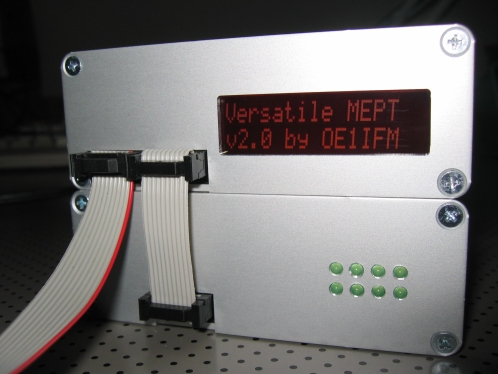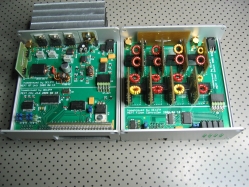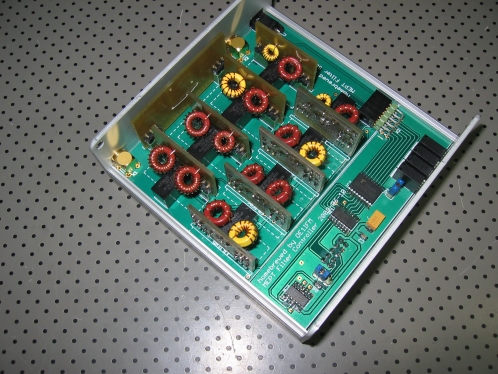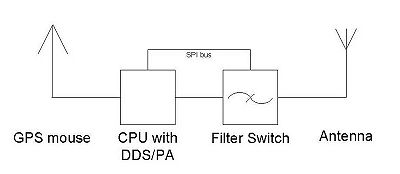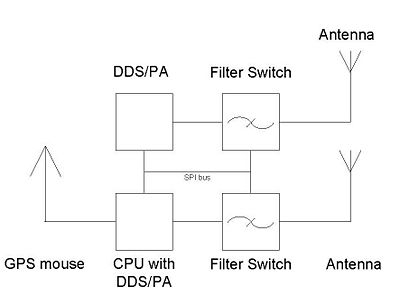Vielseitige WSPR Bake für mobile und stationäre Anwendungen
MEPT = Manned Experimental Propagation Transmitter
Die MEPT WSPR Bake sendet für 2 Minuten die WSPR Bake und wechselt dann automatisch auf ein anderes Band. Die Zeit und den Locator holt sich die Bake vom angeschlossenen GPS Empfänger. Damit können alle Kurzwellen Amateurfunkbänder und 6m abgedeckt werden. Das Gerät ist kompakt aufgenbaut und benötigt für den Betrieb keinen Computer was den Stromverbrauch signifikant senkt.
Es dauerte einige Monate - aber jetzt ist es (fast) fertig.
Das Baken Konzept beruht auf getrennten Modulen die nach den speziellen Anforderungen kombiniert werden können.
Anschlüsse:
- USB interface für die Windows Konfigurations Software
- serial interface zum Anschluss der GPS Maus
- SPI bus für die Datenübermittlung zwischen den Modulen
- ICSP zum programmieren des PIC Prozessors
Ausstattung:
- Windows Konfigurationssoftware
- Die Bake läuft unabhängig vom PC
- Zeit und geographische Position werden hochgenau aus dem GPS Signal gewonnen
- Unabhängige Generierung des WSPR Datensatz im Mikrocontroller der Bake
- Bis zu 8 verschiedene Filter über eine Filterschaltbox anwählbar
- Bis zu 4 Dämpfungsglieder Netzwerke durch die Abschwächer Box steuerbar
- Mehrere DDS & PA Module an einem Controller anschließbar
- DDS & PA Modul für 1.8-50MHz mit bis zu 15W
- Bänder (160m / 80m / 40m / 30m / 20m/ 17m / 15m / 12m / 10m / 6m)
At the moment there are two modules. The CPU box with a DDS/PA module and a switch box that can hold up to 8 filter and one attenuator modules
MEPT SWITCH Modul

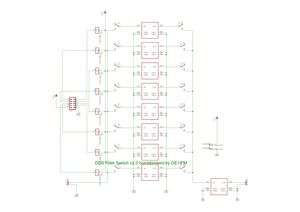
The switch module can hold up to 8 filter or attenuator boards. For bands from 160m to 6m elliptical low pass filters are ready. I am planning a band pass filter for 6m as the local oscillator signals are below the working frequency.
When used with filters there is one additional slot that can hold an attenuator for using the system on an unmatched antenna.
There will be another switch board with 4 instead of 8 positions that will be able to hold attenuator boards of the same size.
MEPT CONFIGURATIONS
BASIC Configuration
The beacon system can be configured in various scenarios. The most simple one is the CPU unit with the integrated PA used stand alone. In this setup a LPF filter module is installed within the CPU box. So beaconing is only possible on one band. Either fixed - with pre programmed Locator - or mobile where location information is derived from the GPS signal.
Multiband Configuration
In this setup the filter module in the CPU/PA module is removed and a Filter Switch Module is installed in the signal path. Through the SPI bus the CPU controls the Filter Switch Module. The module can hold up to 8 filter boards, hence enabling the system to transmit on up to eight different bands. Additionaly an attenuator module can be installed in the Filter Switch Module allow driving of a non resonant antenna. Again fixed and mobile operation is possible. In mobile applications usually a smaller number of bands will be choosen, optimizing probability to be heared at all.
Multiband Configuration with Attenuator Switch
Especially for fixed beacon operation transmittion with variable power levels on multiple bands is desired. In this configuration the multiband config is amended by a Attenuator Switch Module. This module can hold up to 4 attenuator boards and is controlled by the CPU through the SPI bus.
Multiband Configuration with Multiple DDS/PA Modules
When running the beacon in Multiband config with a filter box with 8 boards installed, one will only reach a TX time of 12,5%. To increase the TX time to 25% (or higher) with still covering 8 bands (or more) additional DDS/PA modules with individual Filter Switch Modules can be driven from a single CPU. These signal sources can be attached to diffent antennas as shown, or through a LPF/HPF signal combiner into a single antenna.
MEPT CPU Modul



The main module holds the CPU with USB and GPS serial interface, the master oscillator and one DDS with a 15W PA module. It can be run stand alone and accepts one filter module on the RF unit board.
-
Main Modul Innenansicht
-
Main Modul Innenansicht
-
GPS Satelliten Suche
-
Warten auf Sendeslot
-
Auf Sendung mit Frequenzanzeige
Weiter Informationen: http://www.oe1ifm.at/
